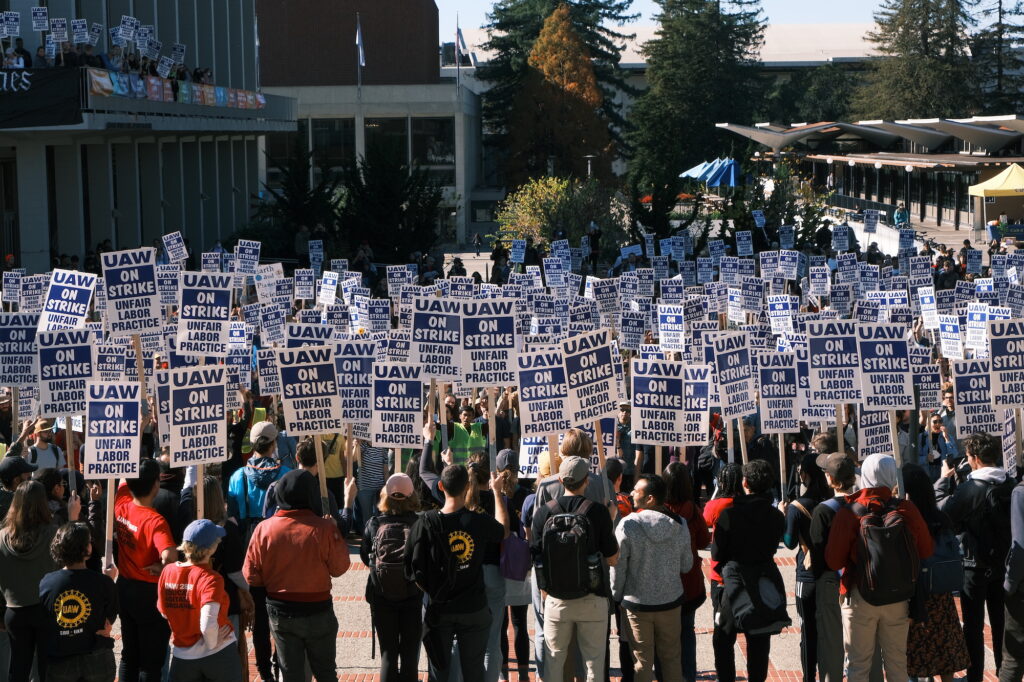
35,654 academic workers at the University of California voted overwhelmingly last November to
authorize their bargaining units to call a strike. Represented by the United Auto, Aerospace, and
Agricultural Implement Workers (UAW), those voting to strike comprised academic student
employees, graduate student employees, postdocs, and academic researchers. The UAW’s press
release notes the historic dimensions of the vote: “With supermajority participation, these are far
and away the largest and most decisive votes ever taken by Academic Workers in the United
States.” Organized under three UAW locals, nearly 48,000 workers went on strike on November
14, 2022.
Two days after the UC strike was announced, the California Labor Federation, an association of
1200 state labor unions and two million members, threw in its support for the action. The CLF
issued a strike sanction allowing its members to picket with the three striking UAW locals. On the day of the strike announcement, the Teamsters Local 2010 issued a similar strike sanction.
The Teamster action authorized nearly all UPS drivers in California the right to refuse delivery
of packages to the University of California. Locally, CUNY’s Professional Staff Congress (PSC)
issued a support and solidarity statement for both the UC strike and the part-time faculty strike
by the ACT-UAW Local 7902 against the New School for Social Research (The New School
strike was settled on 12/13/22 with significant pay raises for adjunct faculty—including pay for
work with students outside of the classroom).
UC workers were moved to strike because of system-wide exploitation and inequity. Echoing
labor demands in other economic sectors, academic workers demanded a wage that would allow
them to live where they worked. UAW surveys found that a majority of graduate workers and
post-docs were rent-burdened and that the average worker spends half their gross income on
housing costs. Academic workers in the UC system bear the burden of these housing costs while
teaching most classes, mentoring students, grading exams, performing the bulk of day-to-day
research, and securing millions of dollars in grants. In addition to a living wage, workers were
demanding transit benefits, job security, and support for working parents and for international
scholars.
UC administrators tried a divide-and-conquer strategy, pitting the UAW local representing post-
docs and researchers against the grad student local. Because post-doc/researcher salaries were
largely paid by the federal government, administrators easily agreed to their wage demands. But
grad students, making up a large majority of those on strike, place a bigger demand on university
budgets. Administrators pleaded that budget constraints would prevent any significant wage
increase for the 36,000 grad students on strike–this in a year when California had a $100 billion
budget surplus. Austerity is the rule even with rosy budgets.
On December 23, under pressure of end-of-semester disruptions of research, exams, and grading,
the 36,000 grad students ratified a two-and-a-half-year contract that significantly raises pay for
part-time graduate researchers (from $22,000 to $35,500) and for teaching assistants ($23,000 to
$34,000). That’s about a 59% increase in pay. The administration also agreed to better benefits,
including transportation assistance (for long commutes), health and childcare, and first-time
contractual protections for newly organized student researchers.
The UC unions’ success has inspired a burst of union organizing at peer institutions across the
country, including many private universities which are harder to organize. Grad students at USC,
Northwestern, Yale, Johns Hopkins, the University of Chicago, Boston University, and MIT
have filed paperwork with the National Labor Relations Board. Other recent grad student strikes,
at Harvard, NYU, and Columbia, won significant concessions from administrations. Columbia’s
grad students waged a ten-week campaign. The university administration conceded on all four of
the union’s demands after the strike threatened accreditation, administrators’ vacations, grade
submission and final exams, and next-semester budgeting. Key to both the UC and Columbia
strike was unflinching unity among a vast majority of members.
by Dr. Tim Strode
